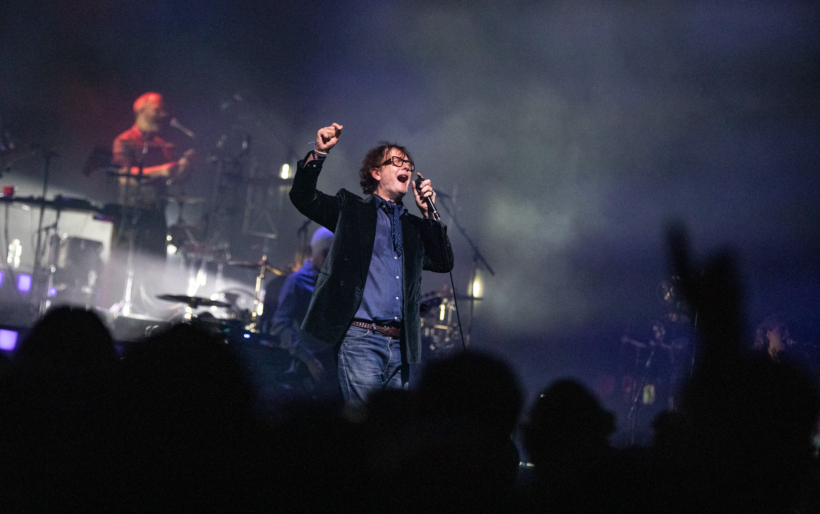Pulp soars at The Met Philly
There are few things in the world as euphoric as a massive Pulp singalong.

Pulp | photo by John Vettese
When beloved Brit rockers Pulp took the stage at The Met this week, it had been just over 29 years since they last performed in Philadelphia. A headlining TLA show in June of 1996 was the last we saw of this stylish, idiosyncratic band that never quite took off in the states. Prior to that, as lead vocalist and frontperson Jarvis Cocker reminisced between songs, they played The Trocadero in 1994, supporting Blur on their Parklife tour. (Talk about an epic Brit rock bill.)
The Met holds double the crowd of both of those other venues combined, and it was packed to the rafters Tuesday night. The crowd was a mix of longtime devotees on their fourth or fifth Pulp show, fans who never got to see them back in the day, and younger listeners who picked up on them in the 2000’s as their cult following amassed. The room was electric as Cocker, often airborne, worked the crowd while backed by an expansive eight-player version of the band. But what makes Pulp’s tour different from those by other reunited artists of their generation, or reunited artists of the generation following, is that they actually have new music in tow. And it’s quite good.

More, Pulp’s first studio album in 24 years, released in June on Rough Trade. It mixes the band’s signature shimmering atmospheres and dynamic energy with stirring lyrics about aging, sex, loneliness, and mortality. (This sounds astonishingly bleak, but as Pulp fans will tell you, their music has always traded in nuanced and often heavy themes, subversively packaged as pop anthems.) We heard that early in the setlist at The Met, when the band kicked into the kinetic rhythms of album opener “Spike Island,” where Cocker, in a mild frenzy, interrogates fame and failure, stares down a mid-life crisis, and boldly chooses to move in a positive direction. (It reads like a celebration of reuniting with his mates in Pulp.)
Just shy of half the album was performed, and for the most part, the audience was locked in. The hammering downbeat of “Got To Have Love,” which speaks most uncynically about finding fulfillment in relationships, had the room on its feet. The yearning “Farmer’s Market” echoes those themes with a dreamy ambience. The serene “A Sunset” closed the night by looking for moments of beauty in a dying planet. Even the slowest number, a slap-bass quiet storm groove aptly titled “Slow Jam,” kept The Met whisper-quiet and attentive; no chatter overtop the band, no mass exodus to the lobby. Ever the showman, Cocker set the song up with a “welcome to the nightclub” sentiment, backed by a projection of The Limit, the Sheffield nightclub where Pulp formed in the 80s and where Cocker said he got his first taste of music as a communal experience.

Speaking of music as a communal experience, there are few things in the world as euphoric as a massive Pulp singalong, and their Met show offered plenty of opportunities for that too. “Disco 2000” lit up the crowd at the beginning of the show; “Do You Remember The First Time?” into “Mis-Shapes” brought fans out into the aisles to dance with voices raised; even the deeper cut “O.U. (Gone, Gone)” had The Met singing (though, to be fair, the crowd’s part was only two simple letters). On This Is Hardcore‘s “Help The Aged,” Cocker joked about his own age (he’s a spry 61 and doesn’t hold back on the dance moves and vocal bravado, but can’t hit the high notes he once could) and asked for fans’ help reaching the peaks of the chorus.
Hearing many of these songs played in Philly for the first time was thrilling, especially at this scale; the texture of the band’s studio work was fleshed out by violinist and vocalist Emma Smith, bassist Andrew McKinney, keyboardist Adam Betts, and percussionist and guitarist Jason Buckle, and they sounded particularly robust on a riveting “Like A Friend.” Pulp’s core four members got their moments to shine alone, too: a delicate acoustic re-imagining of the sweet indie pop of “Something Changed” was played downstage with Cocker on vocals and acoustic guitar, Candida Doyle on keys, Nick Banks on cajon, and Mark Webber on guitar. Cocker said it the first song they rehearsed when they were exploring the idea of reuniting, and was a delight.
And then there was “Common People” – Pulp’s biggest and best-known song, a explosive screed about capitalism and wealth inequality that somehow totally works as a six-minute dancefloor banger. It is Pulp distilled into one perfect song, and it soared, cementing the decades-long bond between band and crowd.
Pulp’s North American tour continues through the end of September; full dates can be found here, More is out now via Rough Trade Records.














